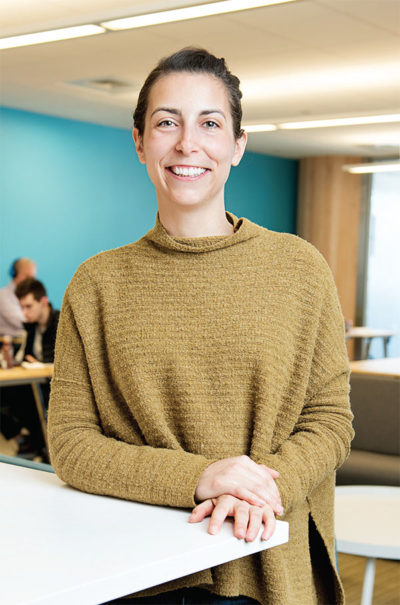
Photo: Webb Chappell
Joanna Geisinger, MBA’17, founder, TORq Interface
Operating rooms. Cadaver labs. An ever-changing surgery schedule. For Joanna Geisinger, MBA’17, these were part of everyday life as a surgical device representative.
During her six-year career in that industry, Geisinger experienced firsthand the thrills and disappointments of working in health care. Contributing to successful joint replacements and life-changing surgeries made Geisinger feel like she was making an impact in patients’ lives, yet she was frustrated by inefficiencies in the system. A typical day could include waiting hours for a delayed procedure to begin or commuting between hospitals only to discover an operation had been canceled.
The more Geisinger talked with colleagues, the more convinced she became that these inefficiencies could be fixed. “Everyone I worked with agreed that it was a big problem,” she says. So Geisinger began thinking about ways to improve the process and formulating an idea for a startup. As she worked, she continued to check in with colleagues. “I wanted to make sure I wasn’t just solving something for myself,” she says, “but that I was solving a real problem in the market.”
In 2015, Geisinger came to Babson with the idea for TORq Interface, a HIPAA-compliant platform that streamlines surgical scheduling. “I wasn’t just trying to get an MBA,” she says. “I specifically came to Babson to launch my company.”
In the U.S., the medical-device supply chain reportedly generates $5 billion in waste each year. TORq’s mission is to minimize inefficiencies by connecting medical-device representatives with hospitals’ surgical planning networks. By automating these communications, the platform could save all involved—including patients—time and money. For example, TORq allows surgical schedules to be shared as many as four weeks in advance, instead of the more typical five days, and they update in real time to reflect the fluid schedules inside a hospital OR.
Currently, TORq is undergoing pilot tests with three Boston-area hospitals, with a fourth starting later this year. Geisinger is hoping for an official launch this fall. As work on TORq progresses, she keeps lessons from her MBA classes in mind. “Babson taught me that it’s not about one idea being better than another,” she says, “but instead about which idea has the best business model and execution.” Geisinger also learned the importance of customer feedback and has updated TORq’s technology using input from the pilot tests.
She is confident that her time in the field will give TORq an edge in the marketplace, but she never underestimates the challenge of innovating within the boundaries of the health-care system. “Health care can be unique in its resistance to change,” she says, “because the stakes are just so high.”
Still, Geisinger is cautiously optimistic about the launch. “Last year, I didn’t know what the customer reaction would be, and I was just praying that a hospital would get on board,” she says. “Now, we’re working with great hospitals, and things feel like they’re starting to come together. It’s a really fun stage for the company.”—Elizabeth Atwater, senior manager, thought leadership content
